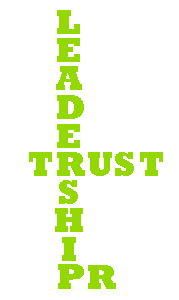Trust has been in the news quite a bit recently. More to the point, the question of “trust” related to those who bring us the news.
Since Brian Williams’ well-publicized fall from grace, the conversation has shifted from the severity of his punishment to general questions about media trustworthiness.
Those ready to throw the book at Williams believe media are sacrosanct and must not impose on the trust placed in it. Others believe that media lies “all the time,” so why trust any of them? Just take everything you hear with a grain of salt.
 What does that have to do with business leadership? Both of these extreme viewpoints can be found across a wide spectrum of human activity.
What does that have to do with business leadership? Both of these extreme viewpoints can be found across a wide spectrum of human activity.
No matter what business you are in, there’s a group out there that will trust you, and for whom that trust is important. Then there’s another group out there who just wants results. They want you to make them feel a certain way.
One key to strong leadership is to understand how to identify and interact with both groups, as well as everyone in between.
In most cases, people fall somewhere between these extremes. They may trust, but there is a point at which trust is less important than results. Or they may not care about trust, but there are some issues that are non-negotiable. If you can’t navigate this particular minefield, you will find your business success and growth potential artificially limited.
Success in this area requires more than ambiguous “people skills.” Leaders must understand the specific levers and buttons related to the various points on the trust spectrum.
That can be more difficult than it sounds because those markers may shift from one profession to the next. If your customers don’t understand what you do, they may care less about trust and worry more about results.
However, if they think they understand what you do, they will be more on the lookout for potential breaches of etiquette or what they perceive to be the correct action.
Then you have the wild card. How much your audience WANTS to trust you? That, in most cases, is based on pre-established consumer PR. This can be powerful stuff. It’s arguably the only thing offering Williams hope of a job in media ever again.
Trust is an imprecise science with very real consequences. Gaining it can be difficult. Regaining it can be nigh impossible. But it can be done, as long as you understand where to begin and which steps to take. Those answers are found in a proper understanding of where your audience lands on the trust spectrum.
Ronn Torossian is the CEO of 5WPR and founder of the Ronn Torossian Foundation.


 AB InBev has hired Donna Lorenson as chief communications officer and elevated the PR function to the senior leadership structure in the aftermath of the Bud Light marketing disaster.
AB InBev has hired Donna Lorenson as chief communications officer and elevated the PR function to the senior leadership structure in the aftermath of the Bud Light marketing disaster. Tunheim handled the Minnesota USA World Expo bid committee, which on June 21 congratulated Serbia for landing the 2027 event.
Tunheim handled the Minnesota USA World Expo bid committee, which on June 21 congratulated Serbia for landing the 2027 event. United Minds, management consultancy, has launched Myriant, a business resiliency offering to help clients deal with the challenges during this era of misinformation, polarization and geopolitical upheaval.
United Minds, management consultancy, has launched Myriant, a business resiliency offering to help clients deal with the challenges during this era of misinformation, polarization and geopolitical upheaval.  ImageShield, which guards against online image abuse, is looking for a communications pro to handle its PR and marketing campaigns.
ImageShield, which guards against online image abuse, is looking for a communications pro to handle its PR and marketing campaigns. Who knew that there is a real paper company, Pennsylvania Paper & Supply, inside the iconic building seen at the opening of every episode of “The Office?”
Who knew that there is a real paper company, Pennsylvania Paper & Supply, inside the iconic building seen at the opening of every episode of “The Office?” 


 Have a comment? Send it to
Have a comment? Send it to 
No comments have been submitted for this story yet.